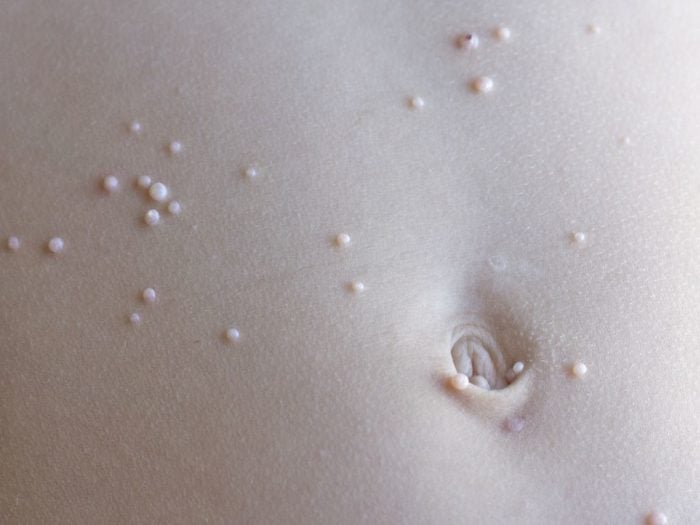Effective home remedies for molluscum contagiosum include the use of neem, apple cider vinegar, tea tree oil, coconut oil, oregano oil, allicin, alcohol, and duct tape occlusion.
Molluscum contagiosum (MC), also known as water warts, is an infectious skin condition that results in groupings of small bumps or lesions on the upper layers of the skin. The bumps may contain a cheesy or waxy substance and are usually painless. The infection is caused by a DNA poxvirus known as Molluscum contagiosum.
This infection can often disappear without treatment of any kind, but pricking, scratching, and irritation can cause the lesions to stick around (sometimes for years at a time!), and thus spread around the body, so being proactive in your treatment for eliminating the virus is a great idea. [1] [2]

Molluscum contagiosum is a viral skin infection caused by the virus Molluscum contagiosum. Photo Credit: Shutterstock
Once the head of the lesion is destroyed or eliminated, the virus is gone, but rapid treatment involves freezing, laser removal, and other rather intense procedures on the skin. A number of home remedies also exist, which can either complement more formal medications or procedures or can be used as a sole method of treatment.
Home Remedies for Molluscum Contagiosum
Let’s take a closer look at the home remedies for molluscum contagiosum:
Neem
Neem is known as an exceptional topical treatment for molluscum contagiosum, and it can effectively neutralize and eliminate the virus. You can boil neem leaves in water and then topically apply this infused water to the affected areas on the skin. You can also bathe in this water. [3]
Apple Cider Vinegar
Apple cider vinegar is very beneficial for molluscum contagiosum due to its antibacterial and antiviral qualities. One of the best ways to utilize this natural remedy is to dip a cotton ball into apple cider vinegar and then tape it to the bumps on your skin. [4]
Tea Tree Oil
Tea tree oil is a trusted, side-effect-free solution that can be directly rubbed on the affected bumps and lesions. Use a cotton ball and dab the bumps 3-4 times per day. Tea tree oil can eliminate the bumps and prevent them from returning within a week or so. [5]
Coconut Oil
Rub coconut oil directly on the affected skin areas to quickly reduce the inflammation and itchiness, and also kill the virus, thus clearing up the condition. [6]
Oregano Oil
Although many people think of oregano simply as a spice, oregano oil boasts a wide range of antioxidant compounds, including thymol, terpenes, carvacrol, and rosmarinic acid. All of these components help to reduce the inflammation of the infected areas and boost the immune system to fight off the Molluscum contagiosum virus. [7]
Allicin
Garlic is one of the most versatile herbal remedies for this condition, primarily due to its high allicin content. Allicin is a powerful antiviral and antibacterial compound that can rapidly neutralize most viral strains, and rubbing a poultice of garlic that has soaked overnight is an easy and effective home remedy for these irritating lesions. [8]
Alcohol
Alcohol can be a simple and effective way to eliminate molluscum contagiosum. Apply alcohol to the skin and cover the area; it works as a natural immune protector and can kill infections. The alcohol can soak into the lesions and neutralize the virus. The lesions will subside and disappear within a matter of days. [9]
Duct Tape Occlusion
It might sound like a strange strategy, but placing a piece of duct tape over the lesions can be a fast and simple way of clearing up the infection. By starving the virus of oxygen and preventing its spread to other parts of the body, you can speed up the healing process and eliminate the inflammation. [10]
Word of Caution: While molluscum contagiosum is not a life-threatening infection, it can persist for years if left untreated. Also, infecting friends, family, and others you come into close contact with is unpleasant and unfortunate, so using a combination of home remedies and more formal prescriptions is strongly recommended.
